Opinion
Electricity tariffs cannot be reduced due to CEB Mafia

Ceylon Electricity Board (CEB) has apparently become a law unto itself; it is increasing the salaries and other perks for senior staff at their will. There are 26,131 employees of CEB and its monthly salary bill is around Rs. 3,000 million, out of which 600 million goes for the salaries of engineers. A special grade engineer’s monthly take-home salary is reportedly about Rs. 919, 432 while an E1 grade engineer draws around Rs. 694,240 a month. These include a vehicle allowance of Rs. 250,000 and other benefits. The CEB has thought it is fit to regularly increase the salaries at the insistence of the powerful engineers’ union every three years without getting the approval of the cabinet or the public accounts committee of the finance ministry.
Out of the total number of employees at least 50% are political appointees recrutied by successive ministers of the power and energy ministry. Even the salary of a meter reader is Rs. 54,420 and it comes to around Rs. 125,000 a month. This is far higher and about 100% more than a graduate teacher. With such an excessive workforce earning exorbitant salaries no wonder that the CEB cannot reduce the electricity bills of consumers. There are 6.29 employees for every megawatt (MW) of power generated by CEB while the Malaysian Electricity Board generates six times more power and has only 1.15 employees for one MW of power generated!
PAYE tax should be borne by the employee and it is against the Inland Revenue Act for an institution to pay the PAYE tax due from its employees. It has been revealed before the COPE (the Committee on Public Enterprises) that Rs. 5 billion has been paid by the CEB as PAYE tax to its employees during the period 2010-2019 in contravention of a Cabinet decision on 13 December 2007. This, the CEB has been doing at the expense of consumers, who have to pay higher tariffs.
Verite Research has revealed that Sri Lankan households pay 2.5 to 3 times more for electricity than the average cost to their counterparts in South Asian countries. Our rates are much higher than in Bangladesh and Afghanistan. For instance, a consumer using 300 units of electricity has to pay an electricity bill of Rs. 21,860 while the average equivalent rate in South Asia is only Rs. 7,340. This shows how our professional engineers have managed the CEB power generation so inefficiently over the years.
The reason for this inefficiency is due to the neglect of renewable energies in Sri Lanka. The CEB engineers have always advocated for more and more coal-powered plants. They have deliberately blocked renewable energy projects for obvious reasons. The Supreme Court has found the CEB guilty of blocking a proposal by Vavuniya Solar Power Private limited for a solar energy plant and ordered it to pay Rs 01 million rupees as damages. This, too, would have been paid from CEB funds and those who took such corrupt decisions have got off scot-free. The technical officers of CEB allege that CEB management has purchased power from private power plants despite an increase in hydro power generation. In case hydropower is insufficient to meet the demand another idling turbine at Norochcholai could have been put into operation. There are serious allegations that CEB engineers are intimately connected to such private power plants and even own all or part of them. The new government should appoint an independent commission to investigate allegations against the CEB.
Concerned Consumer
Opinion
Is AKD following LKY?
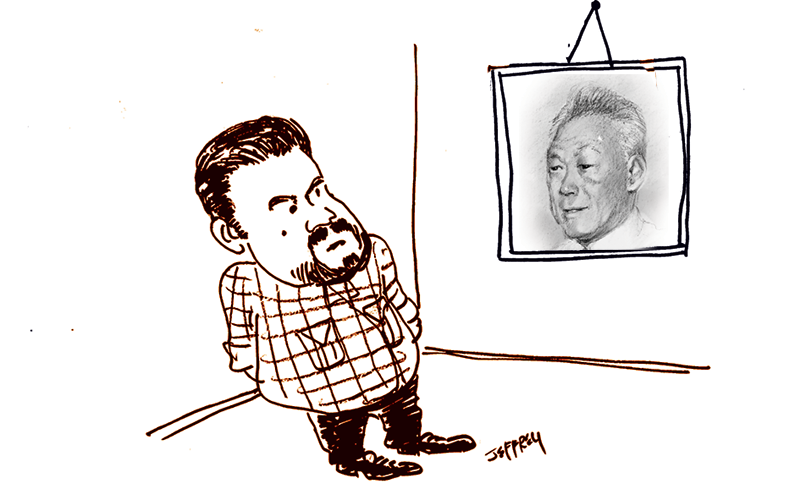
by Chula Goonasekera
Rev. Dato’ (Sir) Sumana Siri
We, the citizens of Sri Lanka, have already witnessed significant reforms in governance under AKD’s leadership. This personally led process must continue consistently, free of bias, and within the framework of the law to ensure sustainable governance by the State, not the individual. Such efforts will help minimise the waste of public funds and lay a strong foundation for the nation’s development in the long term. We often look to Lee Kuan Yew (LKY), Singapore’s founding father, as an example of transformative leadership. He united three diverse ethnic groups—Chinese, Malay, and Indian—under the principle of honesty. Today, Sri Lanka faces profound challenges from past political corruption, economic instability, and social divisions. LKY’s leadership serves as a reminder that integrity, accountability, and a commitment to the greater good can redefine a nation’s destiny, regardless of its size or resources, similar to Singapore.
When Singapore gained independence in 1965, it was a small, resource-scarce nation facing political unrest and ethnic divisions. Yet, within one generation, it became a global financial hub and a first-world country. LKY’s leadership was pivotal, centred on three core principles: meritocracy, integrity, and pragmatic governance. He prioritised national security, social cohesion, and economic growth. His efforts to foster ethnic harmony included implementing bilingual education policies and enforcing anti-discrimination laws. Similarly, AKD should consider enacting legislation to prevent racially motivated demands, i.e. anti-discrimination laws, to safeguard the government from evil, selfish minds trying to destabilise the government’s commitment to equality. Such legislation will stop this burden falling on the leadership case by case.
LKY’s policies, though sometimes harsh, were rooted in practicality and long-term thinking. The Internal Security Act ensured peace and stability during critical years. Likewise, his investments in education and infrastructure established a foundation for sustained growth. His focus on political stability, a robust legal system, and zero tolerance for corruption inspired investor confidence. Singapore’s Corrupt Practices Investigation Bureau (CPIB) was empowered to tackle corruption at all levels. Sri Lanka must adopt a similar mindset to revitalise the Bribery and Corruption Commission, moving away from populism and short-term fixes in favour of strategic, future-oriented policies.
AKD’s primary election theme was anti-corruption, reflecting a key aspect of LKY’s leadership. His unwavering stance against corruption defined LKY’s pragmatic governance. He held public officials to the highest accountability standards, ensuring that anyone guilty of corruption faced severe consequences, including dismissal, public exposure, and prosecution. By rooting out corruption, Singapore built domestic credibility and attracted global investment. We in Sri Lanka need such legislation at the earliest opportunity to deal with various kinds of corruption that are appearing again and involving many public officials.
In Sri Lanka, corruption has long undermined public trust in institutions and stifled economic growth. With overwhelming public support, AKD is well-positioned to deliver on his promise to combat corruption. However, this needs to be done early before the government gets entangled with controversy over its own ‘tiered’ standards. Through comprehensive legislative measures, Sri Lanka can rebuild its institutions, restore public confidence, and chart a course toward sustainable development.
LKY was considered “cruel” by some because he treated all races equally without favouring any. AKD shares a similar stance. One of the hallmarks of LKY’s leadership was his unwavering commitment to meritocracy. This created a culture of excellence where the best and brightest minds were responsible for leading the country. In Singapore, recruitment and promotions across all sectors were strictly based on merit—capabilities, skill sets, and abilities—not on connections, nepotism, racial considerations, or personal favouritism. Although challenging to implement, meritocracy can be implemented with the open advertisement of qualifications needed, a transparent appointment process, strict job plans with annual reviews linked to customer feedback, and personal development strategies that are considered a necessity to continue. This approach will foster a culture of excellence and innovation, like Singapore, ensuring that the most capable individuals propel the country forward.
Sri Lanka must break free from the grip of favouritism and focus on nurturing talent through equal opportunities for all citizens, regardless of ethnicity or social background. Early signs of this approach are visible under AKD’s leadership. LKY understood that for a nation to progress, its institutions must be led by those who are truly capable, irrespective of their background. By adopting meritocracy, Sri Lanka could break the cycle of favouritism, nepotism, and ethnic division that has often hindered its development. Establishing a system where opportunities are based on ability and performance could unlock the full potential of Sri Lanka’s people, fostering a culture of innovation, growth, and national unity.
After gaining independence in 1965, during Singapore’s formative years, LKY focused on eliminating corruption, gang activities, and communist threats to create a peaceful and secure nation. The Internal Security Act (ISA) granted his administration discretionary powers to arrest and detain individuals without trial, when necessary, to prevent actions deemed harmful to Singapore’s security, public order, or essential services.
The ISA allowed preventive detention, suppression of subversion, and countering of organised violence against persons and property. Sri Lanka urgently needs a similar act to ensure that politicians and public officials comply with legally binding measures. With its Parliament still in its formative stages, we hope Sri Lanka will soon establish a comparable Internal Security Act. By eliminating corruption at all levels, as LKY did, Sri Lanka can inspire public trust and attract international investors who view stability and a corruption-free environment as prerequisites for investment. This approach could transform Sri Lanka into a manufacturing, business, and financial hub for the Indian Ocean region.
Under LKY’s leadership—often described as strict—Singapore transformed from a third-world nation into a first-world country. Sri Lanka has the potential to achieve even more, given its abundant natural resources, strategic location, and educated population that can be developed into a skilled workforce. With its prime position in the Indian Ocean, Sri Lanka could become a regional economic powerhouse—provided it fosters a stable and investor-friendly environment. Like Singapore, Sri Lanka should adhere to a non-aligned foreign policy to emerge as a crucial node in global trade and finance, maintaining friendly ties with Eastern, Western, and Asian powers while leveraging its strategic location.
While some label LKY’s methods as “cruel,” his leadership was not about oppression but discipline and fairness. Whether these policies were “cruel” or benevolent is debatable, but their results speak for themselves. He treated all races equally, fostering harmony in a diverse society by ensuring everyone felt they had a stake in Singapore’s future. Moreover, LKY’s economic policies were marked by simplicity and foresight. Low personal income taxes, the absence of capital gains and inheritance taxes, and a business-friendly environment encouraged reinvestment and entrepreneurship. By positioning Singapore as a global trade and financial hub, LKY ensured its economic resilience. Sri Lanka, too, must prioritise national unity. Divisive politics and ethnic biases must be curtailed to build a shared vision of prosperity and peace, as AKD is striving to do.
LKY’s leadership was built on three core tenets relevant to Sri Lanka today: meritocracy, integrity, and pragmatism. Encouragingly, AKD appears to be moving in a similar direction. One of LKY’s greatest strengths was his pragmatic, long-term approach to governance. He maintained tight control over domestic finances, preventing the internationalisation of the Singapore dollar and limiting the operations of foreign banks. This created an environment that attracted international firms eager to establish themselves in Singapore. Sound financial policies, a corruption-free environment, and a focus on technological advancement helped Singapore become a hub for multinational companies like General Electric. State-owned enterprises like Temasek Holdings and Singapore Airlines were run with business efficiency, often outperforming private sector competitors. Sri Lanka could adopt a similar model to enhance the performance of its state-owned enterprises and boost economic growth.
Singapore adopted a two-pronged financial strategy: becoming an international financial hub while ensuring its financial sector supported key domestic industries like manufacturing and shipping. Additionally, integrating foreign and local talent fuelled decades of sustained economic growth. LKY’s focus on economic development, making Singapore an attractive investment destination, and drawing world-class manpower offer valuable lessons for Sri Lanka.
To replicate such success, Sri Lanka must invest in state-of-the-art infrastructure, establish excellent air and sea linkages, and maintain a low and transparent tax regime.
Clean and efficient bureaucracy, a strong regulatory and legal framework, and a neutral diplomatic policy—balancing relations with global powers like the US and China—are critical. Developing clean, green cities powered by sustainable energy will also be key to achieving remarkable economic success akin to Singapore’s.
Opinion
‘A degree is not a title’ – a response

Reference the above-captioned letter in The Island of 16 Decembe, its writer, Philosophiae Doctor (PD), he is incorrect in his analysis of a Ph. D degree as a title. As Dr. Upul Wijewardena has said, only a Ph. D holder who can use the title ‘Dr’. However, the tradition is for those who have a medical degree to be called Dr. PD has written about the history of universities and quoted chapter and verse about the origin of degrees. We are now in the twenty first century and most universities have their own system of awarding Ph. Ds. For instance, British universities award Ph. Ds based on 100 per cent research whereas in American universities Ph. D degrees are awarded on the basis of 50 per cent research and 50 per cent course work. The research degree is given more weight at interviews.
PD has also said that a Masters’ Degree (MA) is essential to teach in a university. Many universities including universities in Sri Lanka offer Assistant Lecturer positions to those who have first degrees with classes. Some time ago, the Dean of the faculty of Arts at Otago university, New Zealand had only a B.A. He was appointed Professor because of his publications. In American universities lecturers with a Ph. D are addressed as Assistant Professor. Then a Professor after retirement has to get permission from his university to use the title as Professor (Emeritus). There is no such requirement for a person with a Ph. D to use the title Dr. Modern universities do not follow procedures that were adopted in old Europe mentioned by PD.
Dr. P. A. Samaraweera
Opinion
Climate Change Karma: Who is to be blamed? – II
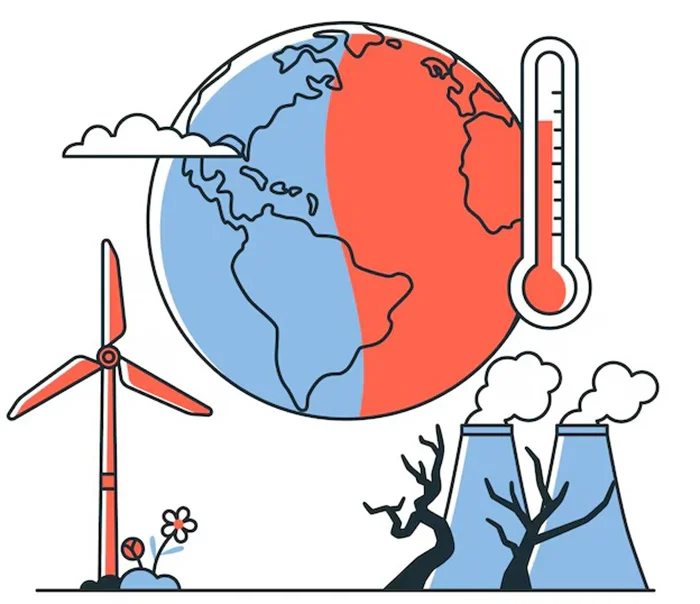
BY Amarasiri de Silva
(Emeritus Professor, University of Peradeniya)
(Continued from yesterday)
Sri Lanka, like other South Asian countries, is faced with the grimmest realities of repeated climate-related disasters: widespread flooding, destructive cyclones, desertification, and increasing sea levels pose a threat to economic stability, food security, and social structure. This region is especially susceptible due to the combination of geographical vulnerability and the socio economic challenges many of its nations face. Violent monsoons and extreme weather cause flooding that disrupts livelihoods, wash away critical infrastructure and displaces vulnerable communities as reported in the newspapers and news programmes. These cyclones, now more substantial and frequent due to warming oceans, batter coastlines and leave governments with the daunting task of rebuilding whole towns and addressing resulting humanitarian crises.
Desertification, brought about by unsustainable agricultural practices and shifting rainfall patterns, is one of the most threatening factors to agricultural productivity, especially in countries whose economy relies heavily on farming. In Sri Lanka, the results are slowly but surely being seen as rice production is hit hard by recurrent floods. These have disrupted crop yields and pushed rice and coconut prices to unprecedented levels, worsening economic challenges for farmers and consumers alike.
Meanwhile, sea-level rise is expected to further decline the low-lying coastal areas through loss of arable land, salination of water resources, and displacement of the coastal population. South Asian governments face all these challenges within a limited resource base, often being forced to choose between immediate crises and long-term climate resilience. The situation is a perfect example of the urgent need for robust climate adaptation strategies, international cooperation, and fair financial support by developed countries to arrest in some way or reduce the impacts of a crisis to which the said countries have contributed insignificantly.
Impacts of Climate Change in Sri Lanka introduce a new epoch characterised by unprecedented and unfamiliar weather-related vocabularies we never heard of such as “atmospheric rivers” and named cyclones that frequently disrupt the environment and livelihood in the country. These, in turn, have grave implications for weather extremities, especially in agriculture and infrastructure. Heavy rains from atmospheric rivers and cyclones result in widespread flooding, which destroys crops and decimates villages and towns. Farmlands get submerged, causing massive losses in food production and endangering the livelihood of farmers. Infrastructure such as roads, bridges, and buildings get washed away, thus isolating communities and inhibiting disaster relief efforts. However, the human cost too has been very high, with many people having lost their lives trying to navigate or escape rising flood waters. The new developments show that even the developed countries are being affected by climate change issues. For instance, as reported by Liza Gross in the Justice & Health Newsletter the storm-swollen Pajaro River, which forms the border between Monterey and Santa Cruz County to the north—had demolished a section of the levee and inundated the whole settlement. Also, Gross reports that dozens of California farmworkers are dying from the heat in regions with persistent air pollution.
Apart from immediate effects, these disasters translate into long-term socioeconomic issues. Whole families are rendered homeless, their homes reduced to rubble, which in turn creates shelter crises and more vulnerable citizens. Recovery from these events usually takes years, as rebuilding can barely keep pace with such incidents.
The consequences of global warming are being borne inequitably by countries such as Sri Lanka, with about 1.02 CO2e tons/per person, considered low-carbon-emitting countries that have contributed very little to total global emissions. Although Sri Lanka is a low-emission country, it is very vulnerable due to rising sea levels, unpredictable monsoon cycles, and increased frequency of extreme events like floods and droughts. Why? These phenomena have dire consequences for the country’s agriculture, infrastructure, and overall economic stability. For instance, erratic rainfall can destroy paddy fields, while prolonged droughts can deplete water sources, further jeopardizing food security and livelihoods.
This unequal burden of climate change underlines a profound issue of climate injustice- low-emission countries getting the most significant impact of climate change. While the developed world has benefited much economically through industrialisation and fracking, poor countries like Sri Lanka bear a huge environmental toll. These further disadvantages poor nations, most of which are constrained by finance or technique in responding to adaptation or mitigation needs thrown up by global warming. For example, rebuilding after recurrent floods or changing agricultural patterns in Sri Lanka often overwhelms the country’s economic capacity and pushes vulnerable communities further into poverty. This calls for a collective global approach: the developed world should take full responsibility for its historical role in creating the climate change problem through radical emissions cuts, moving away from destructive practices such as fracking. Beyond that, they have to provide financial and technological support to countries like Sri Lanka to adapt to the challenges thrown up by climate change. Initiatives like the Green Climate Fund to support vulnerable nations have always fallen short of the scale required for the crisis.
Moreover, such a framework as the Paris Agreement requires urgent international cooperation if rich countries are to contribute to global climate action. Global action on climate change would ensure a role in the Paris Agreement through which wealthy countries should play their responsibilities toward taming climate change. The Paris Agreement, signed in 2015, aims to control the global average temperature to well below 2°C above pre-industrial levels, pursuing efforts for 1.5°C by requiring countries to establish their NDCs and work toward low greenhouse gas emission economies. This puts the onus on wealthier nations not only because of their historic role in emitting pollution but also due to much higher financial and technological resources to make any difference by tackling climate-related challenges.
The agreement respects the principle of “common but differentiated responsibilities and respective capabilities.” This means that the developed nations, historically the largest emitters of greenhouse gases, are supposed to take the lead in reduction and provide financial and technological support to developing countries. Also, under this agreement, the Green Climate Fund will have to mobilise $100 billion annually from developed nations for climate adaptation and mitigation in poor countries. Such a financial mechanism points toward the need for equitable sharing by wealthier nations, fairness of which is only part of the obligation from the global perspective.
By signing the Paris Agreement, the developed world committed itself to cutting its emissions, besides helping developing countries shift toward renewable energy, establish climate-resilient infrastructure, and handle loss and damage due to the changing climate. Without this, global efforts to combat climate change would be highly unequal, leaving vulnerable nations to bear the full brunt of a crisis they contributed little to create. It represents the shared global vision in which the developed countries lead in realising climate justice and equity in action.
This is a systemic change that needs to happen now, reminded by the interaction between developed and developing nations on climate change issues. While developing countries like Sri Lanka take adaptation and resilience-building seriously, it is up to the developed world to reduce emissions and promote a more equitable response from the world to this shared crisis. Without this, the ravaging effects of climate change will continue to exacerbate global inequalities and further threaten the lives and futures of people who bear the least responsibility for the problem.
The just-ended UN Climate Change Conference, COP29, held in Baku, Azerbaijan, discussed critical climate challenges and pressing ahead with global climate objectives. The key themes emphasised the urgent need to take necessary steps to limit the increase in global temperature to 1.5°C, reflecting the critical threshold for preventing catastrophic climate impacts. Additionally, there is a call to ramp up ambition toward Nationally Determined Contributions (NDCs) to ensure that nations meet and exceed their climate commitments. Another crucial focus is making the Loss and Damage Fund functional, enabling it to provide effective assistance to climate-vulnerable countries disproportionately affected by climate change’s consequences. The conference underlined updates to carbon market guidance under Article 6 of the Paris Agreement and called for increased financial commitments for adaptation and mitigation.
The significant initiatives included the Climate Finance Action Fund of Azerbaijan, which asks for $1 billion a year from the producers of fossil fuels to be reinvested in renewable energy and disaster response programs. Another primary emphasis was on adaptation finance- the need to bridge the gap- and how developed nations are trying to double adaptation funding by 2025. While there is progress, challenges remain, particularly on funding and commitment levels by key stakeholders.
The conference was controversial, with activists attacking the hosting role of Azerbaijan because of its human rights record and reliance on fossil fuels- a broader tension between climate action and geopolitics. Leaders said far more needs to be done together if global targets are to be met, and the next few years will be crucial for implementing the climate policy and achieving long-term resilience.
Climate change protests are practically unheard of in Sri Lanka. While demonstrations around the world raise awareness about environmental issues, Sri Lankans are overwhelmed by the immediate consequences of climate change, like recurrent floods and the devastation of paddy fields, and demolition of houses. These challenges need urgent attention but have not translated into collective resistance or advocacy. It underlined a need to raise a more profound awareness about climate change and broader implications related to climate change among the general public.
More important to their solution, however, could be played by the government of Sri Lanka rather than mere grassroots protests. In this line, it has been very important to form a dedicated organisation for implementing climate adaptation strategies while seeking financial compensation through international mechanisms, such as COP29. It can also unite with other poorer nations affected by climate change in demanding reparations and support from larger carbon-emitting countries, holding them responsible for the disproportionate impact of climate change on vulnerable nations like Sri Lanka.
However, how it works in Sri Lanka is yet to be decided. The backlash seen in most places worldwide, such as disruption to civic life and alienation of would-be sympathisers, calls for more collaboration on this issue. Instead, these disruptive demonstrations, solutions suggested by theorists, provide a better alternative. In recent elections, Sri Lanka voted for a system change that includes restructuring of economies in such a way that sustainability is built into their core.
Combining those aspects with the advocacy of the government for structural economic change holds far better promises for Sri Lanka efficiently to address the immediate challenges of climate change for long-term resilience and sustainability. This calls for Sri Lanka to consider climate justice through policy streamlining and introducing key measures such as carbon taxes, cap-and-trade mechanisms, and integrating green technologies within a capitalist framework. These reforms will strengthen the country’s climate justice regime while tackling systemic environmental concerns. Furthermore, the government must develop a comprehensive estimate of the damages, detailing the losses due to climate change, repair costs, and rebuilding lives of the affected people. This claim should be submitted promptly and immediately to COP29 for reparations and support so Sri Lanka can build back better and more equitably. (Concluded)
-

 Opinion4 days ago
Opinion4 days agoDegree is not a title!
-
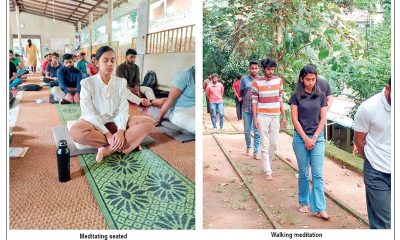
 Features5 days ago
Features5 days agoSpiritual Awakening of a Village
-
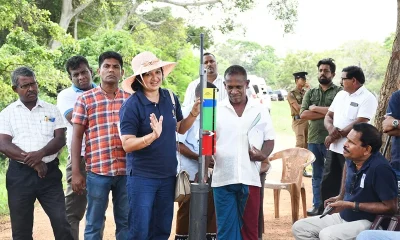
 News3 days ago
News3 days agoInnovative water management techniques revolutionising paddy cultivation in Lanka
-

 News6 days ago
News6 days agoOver 300,000 Sri Lankans leave for overseas jobs this year
-

 Latest News6 days ago
Latest News6 days agoIndia’s Gukesh beats China’s Ding to become youngest chess world champion
-
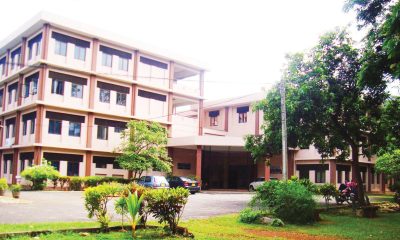
 Features5 days ago
Features5 days agoRevisiting the role of education in shaping shared futures
-
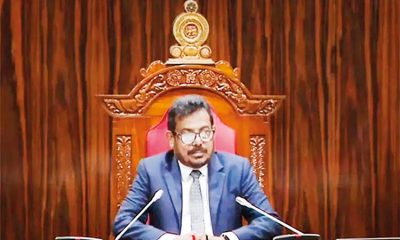
 Features5 days ago
Features5 days agoThe Silence of the Speaker and other matters
-
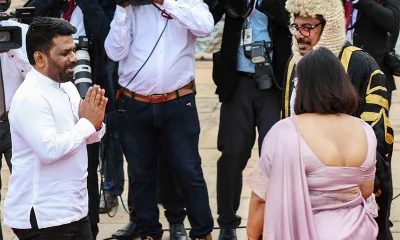
 Features2 days ago
Features2 days agoThe Degree Circus











